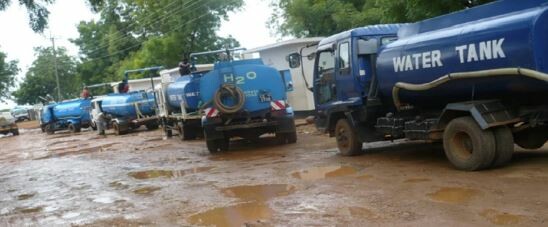On Thursday, I read with extreme indignation and revulsion, a story run by one of the local media outlets in Juba which reported that the Economic Cluster chaired by the slight and affable Vice President James Wani Igga approved USD 9 million to procure 100 water tank trucks to deliver water in and around Juba City.
The harebrained idea was hatched during the cluster’s meeting on Wednesday. Deputy Agriculture and Food Security Minister Lilly Akol Akol, a member of the cluster that is supposed to craft our economic progress, then dashed to the national broadcaster to break the good news and smugly announced that the program will commence with the procurement of 50 trucks.
I was immediately dumbstruck and horrified at the wisdom, or lack of it, that the ‘distinguished’ South Sudanese leaders that comprise that cluster exhibited and many questions came to mind.
First of all, the plan to buy the water tank trucks does not make a smidgen of economic sense. It can, at best, have some logic if the plan is to create another pipeline to siphon monies. Does the Dura Saga ring a bell?
Technically, those funds would be put to better use by using it to extend the piped water supply network that the Japanese taxpayers, through their government and JICA, graciously, generously, and tediously constructed in Juba, to the city’s suburbs and far-flung areas that are not yet on the network.
Economics and financial pragmatism also indicate that using the USD 9 million to extend the piped water supply network in Juba would be a one-off cost and a solid and sound investment that will last long and mitigate the water problem decisively.
Another question that pops into my mind is who will operate the said trucks. Will they be given to a private operator to run under a Public-Private Partnership? Our government has never been proficient at business, this we all know. Elements in there even purloin the tax revenues collected to help run the country.
In the unfortunate event that the government, at whatever level, attempts to operate the business of operating the trucks to commercially distribute water at a subsidized rate (that must be the logic?), sooner or later, the trucks will grind to a halt due to poor maintenance. Others will simply disappear into the compounds or village homes of suited politicians and Generals, etc. Once the trucks are grounded and or disappear as they are wont to, the water problem will still be there staring the people square in the face and the fat cats will only get fatter.
This makes one reminisce about the 1,000 tractors the government bought to catalyze food production to attain food security across the country. What happened to them by the way? Most of our citizens still rely on humanitarian food aid.
Unfortunately, and for the umpteenth time, our leaders, as usual, have their priorities upside down. Is it done by design, ineptitude, or ignorance?
A quick computation summates that one water tank truck will cost USD 90,000 since the cluster has decided to buy 100 of them for USD 9 million. They must be made of titanium. Browsing the internet, I found that the Chinese sell brand new ones for between USD 10,000 and 40,000 FOB, depending on the size and capacity. They cost more in Europe but our wise leaders will naturally drift to China. That is if they have not already identified used ones that have been reconditioned and given a fresh coat of paint somewhere. Looks like a well-planned heist?
Next, I called a water engineer buddy to put things in perspective and he explained that the USD 9 million could be used to build a water supply network in three small towns in South Sudan or firmly lay the equivalent of between 500 and 600 kilometers of water piping. This would matter-of-factly go a long way in extending piped water to many parts of Juba.
I also am positive that many of us Juba residents will even dig into their pockets and contribute to ensuring that their households are connected to a main pipe that passes near their homes. It would be cheaper and more reliable than buying water from those who distribute it using water tank trucks in the long run.
It now begs the question, how do our leaders think? That so-called economic cluster is headed by a holder of a doctorate in Business Administration and staffed by economic advisors but they have failed to contain the runaway inflation that has debilitated South Sudan for years. Can anyone in their rightful mind endorse such a scheme?
The other logical explanation is that the arrangement is meant to hoodwink the residents of Juba into voting for the SPLM Party during the forthcoming elections. However, we are woke and have suffered insecurity, runaway inflation, lack of basic services, etc. at the hands of the SPLM and its several affiliates that have reduced the people of South Sudan to the wretched of the earth.
We will simply weigh candidates on their merits and plans if given a genuine chance to vote freely.
The water tank trucks are a subterfuge to eat money. Tactlessly, maladroitness and a rooted culture of pilfering pervade all sectors of the Government of South Sudan, which has nothing positive to show year in year out on its report card, resultantly.
God Bless South Sudan indeed!
The author, Koka Lo’Lado, is a journalist and can be reached via kokalolado@gmail.com
The views expressed in ‘opinion’ articles published by Radio Tamazuj are solely those of the writer. The veracity of any claims made is the responsibility of the author, not Radio Tamazuj.




